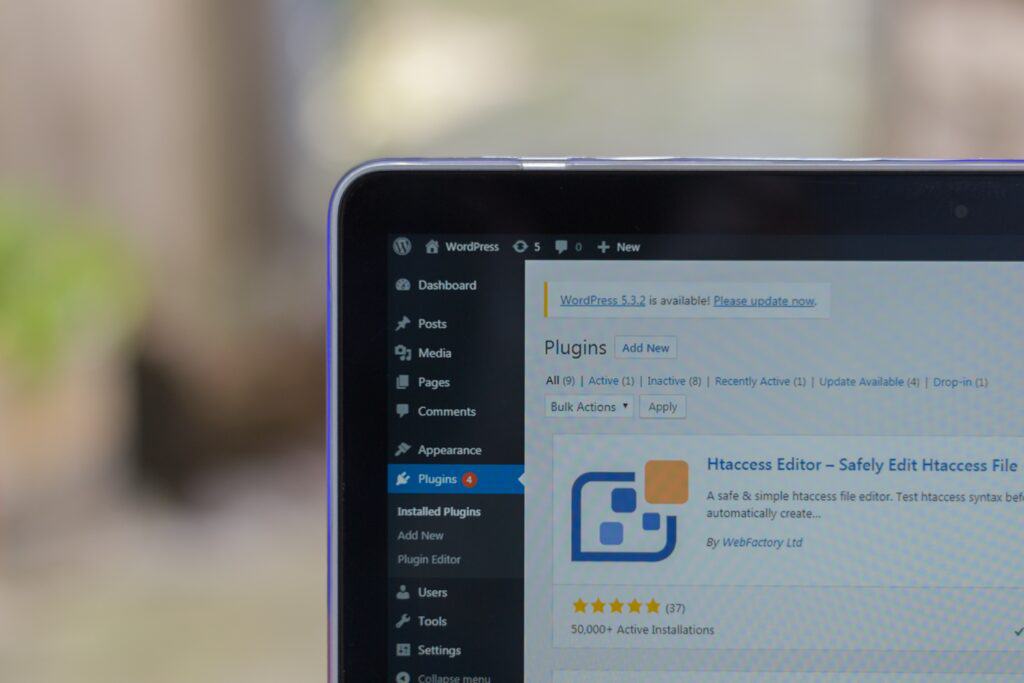
FREE Download For You
30 Best Tactics to
Maximize E-commerce Conversions
Have you ever wondered, “is WordPress good for ecommerce?” You’re not alone. The world of online selling can feel like a bustling city market, overflowing with stalls and options – so how do you pick the right one?
I remember standing at this crossroads once. A labyrinth of choices lay ahead: Squarespace, Shopify… And then there was WordPress – an open-source content management system known more as a blogging platform than an online shop.
The decision felt akin to picking out fresh produce in said market; choosing between the vibrant but potentially overripe apple or the less flashy yet reliably sweet pear. That’s when I decided to bite into what WordPress had to offer.
Spoiler alert: it tasted pretty darn good!
Intrigued? I’m glad! As we explore this, let’s dig deeper and uncover what lies beneath.
Table Of Contents:
- Understanding WordPress as an Ecommerce Platform
- Exploring the World of Ecommerce Plugins on WordPress
- Leveraging Themes for Building Attractive Ecommerce Websites on WordPress
- Optimizing WordPress Ecommerce Sites for Search Engines
- Payment Processing in WordPress Ecommerce
- Setting Up an Online Store with WordPress
- FAQs in Relation to Is WordPress Good for Ecommerce
- Conclusion
Understanding WordPress as an Ecommerce Platform
Many business owners turn to WordPress, a popular CMS, when starting their ecommerce venture. But why do so many people choose WordPress for their online shops? The answer lies in its flexibility and wide array of customization options.
The platform’s versatility stems from its open-source nature which lets users tweak and adjust various aspects of their site. Its flexibility and range of customisation options make WordPress an ideal choice for ecommerce businesses looking to stand out from the competition.
Popularity of WordPress among Ecommerce Businesses
If you’re asking “Is WordPress good for ecommerce?”, let me share some interesting stats with you: According to data, WordPress is currently the most popular CMS available on the web. Its popularity isn’t limited just to bloggers or small-scale websites but extends into the world of ecommerce too.
A key reason behind this popularity is how seamlessly WooCommerce, one big player in the arena of ecommerce plugins, integrates with any current WordPress setup. With extensive customization options at your disposal through WooCommerce alone, it becomes easy to see why so many prefer using WordPress when setting up shop online.
Besides WooCommerce, there are also other reputable platforms like Ecwid, BigCommerce, and Magento that work hand-in-hand with WordPress, providing even more ways to sell products efficiently on your site.In fact – between these four integrations alone – chances are high that whatever specific needs your store may have can be met by choosing WordPress as your base platform.
The Flexibility Advantage
Apart from integration capabilities with major platforms like WooCommerce, Ecwid, BigCommerce, and Magento, WordPress offers a myriad of other customization options. From SEO-friendly features to mobile responsiveness – the flexibility it brings is immense.
different layouts. They can even fiddle around with their site’s aesthetics, making it more appealing to their target audience. This flexibility gives them the chance to adapt quickly and effectively to market trends without needing professional help.
Exploring the World of Ecommerce Plugins on WordPress
The magic behind a successful ecommerce website lies in its plugins. On WordPress, these add-ons can dramatically enhance your site’s functionality and performance.
WooCommerce – The Leading Ecommerce Plugin
Consider WooCommerce, for instance. It’s not just another feature plugin; it’s a game-changer that offers extensive customization options to tailor your online store exactly as you envision it.
This popular ecommerce plugin powers countless WordPress users worldwide, making their dreams of selling products online come true with ease. From digital downloads to subscriptions and even appointments, WooCommerce enables an array of sales scenarios that cater to almost every business need.
And here’s the kicker: setting up WooCommerce is easy-peasy. Its setup wizard guides you through all necessary steps, ensuring your store is ready faster than you can say “online shopping”. No wonder WooCommerce tops our list.
Other Noteworthy Ecommerce Plugins
If you think this ends at WooCommerce, brace yourself for more. There are other impressive players in the world of WordPress ecommerce plugins which deserve equal attention.
Easy Digital Downloads (EDD), though less known compared to its counterparts like WooCommerce or Shopp, provides simplicity and elegance when dealing with digital goods—ebooks? Music files? Software applications? You name it; they’ve got it covered.
Note: Don’t get lured by lower-quality plugins promising fast results but offering limited support. Instead, stick with trusted solutions like those mentioned above.
With so many incredible tools available at our fingertips thanks largely due not only excellent design capabilities but also strong community backing each one – there really has never been a better time than now to dive into creating an ecommerce web presence on WordPress. Ensure you select the most suitable tool for your task.
Leveraging Themes for Building Attractive Ecommerce Websites on WordPress
Creating a visually appealing ecommerce website is an art. Creating an experience that draws in your audience and keeps them engaged is essential to building a successful ecommerce website. With the right WordPress theme, you can turn your online store into a captivating digital marketplace.
Free and Premium Ecommerce Themes
The beauty of using WordPress as your ecommerce platform lies in its versatility. Many different themes are accessible, each with its own distinctive design components to fit various business requirements. For instance, Storefront is a free option perfect for beginners due to its simplicity and seamless integration with WooCommerce.
If you’re looking for more advanced features or customization options, premium themes like Shopkeeper and Neighborhood offer high-quality designs that are both attractive and user-friendly.
But remember: choosing the right theme isn’t only about aesthetics—it’s also crucial from an SEO perspective because search engines favor sites that provide excellent user experiences.
Making Your Choice – Free vs Premium Themes
You might be wondering if there’s any significant difference between free and premium themes besides price? The answer is yes. While free themes give access to basic functions suitable for startups or small businesses; premium ones offer extensive customization options—like adjusting color schemes or fonts—that let you make sure every detail aligns perfectly with your brand identity.
Moreover, paid versions often come with dedicated support which can prove invaluable when facing technical issues.
| Free Theme (e.g., Storefront) | Premium Theme (e.g., Shopkeeper) | |
|---|---|---|
| Key Stats: There are numerous ecommerce themes available for WordPress, such as Storefront, | ||
| Design Options | Limited | Extensive customization options available. |
| User Support | No dedicated support provided. | Dedicated customer service for troubleshooting and assistance. |
Optimizing WordPress Ecommerce Sites for Search Engines
The world of ecommerce is a competitive one. To make sure your online store stands out from the competition, you need to employ effective SEO strategies. One crucial factor? Your site’s search engine optimization (SEO).
Importance of SEO in Ecommerce
In this digital age, where product searches often start on search engines like Google or Bing, it’s vital that your WordPress ecommerce site ranks high in these results. That’s where SEO comes into play.
A website that is optimized correctly can draw in more visitors and, by providing a pleasant user experience as well as pertinent material, convert them into customers.
To give you an idea: 93% of all web traffic comes through search engines. So neglecting SEO could mean missing out on potential sales.
Using YoastSEO for Site Optimization
YoastSEO plugin, widely used among WordPress users, is a powerful tool designed to help optimize your website from every angle – be it meta tags creation or XML sitemaps submission.
This nifty tool lets you craft keyword-focused content which aids higher ranking in search engine result pages (SERPs). You get real-time feedback while writing posts or product descriptions about how well optimized they are.
Say goodbye to guesswork; Yoast helps make sure each page stands its best chance at achieving high rankings on SERPs. Plus, being an open-source platform means lower-quality plugins have no room here.
Payment Processing in WordPress Ecommerce
The lifeline of any ecommerce site lies within its ability to handle payments effectively. And when it comes to a WordPress ecommerce setup, integrating multiple payment gateways can give your online store the competitive edge it needs.
Stripe Integration with WordPress
In today’s digital marketplace, Stripe stands out as an excellent choice for processing transactions. With Stripe, you’re not just getting a simple gateway; you get access to powerful features that enhance your ecommerce capabilities.
Say goodbye to tedious manual processes and hello to automated invoicing and subscription management. It even allows customers from around the globe by accepting over 135 currencies. Security is paramount, with all transactions securely encrypted from start to finish.
PayPal and Square as Payment Options
If variety is what you’re after then adding PayPal and Square is a must. You don’t want potential buyers bouncing off simply because their preferred method isn’t available on your platform.
The integration process for both PayPal and Square are seamless with WordPress. These platforms have become synonymous with safe online transactions globally – giving customers peace of mind while shopping on your site.
Remember that each additional payment option adds another layer of convenience for shoppers across different demographics.
The more payment gateways you offer, the better for customers of all backgrounds. Well, when talking about payment gateways in an e-commerce setting—this couldn’t be truer.
The beauty about using WordPress? Its compatibility with numerous payment gateways like Stripe, PayPal, and Square. With WordPress handling your ecommerce needs, you can easily cater to a global audience with varying payment preferences.
Now, isn’t that the kind of flexibility every online store owner dreams about?
Setting Up an Online Store with WordPress
Taking the plunge to begin selling items online may seem intimidating, yet it doesn’t have to be. Let’s focus on how you can use WordPress and WooCommerce to set up your ecommerce store.
Easy Setup with WooCommerce
The WooCommerce plugin, a popular ecommerce integration for WordPress users, provides a setup wizard that makes creating an online store less intimidating than assembling furniture from IKEA.
This robust tool gives business owners extensive customization options for their online shop. You don’t need a degree in web design or hire expensive developers; think of it as your personal eCommerce website builder right within your current WordPress site.
You’ll find relevant product searches easy because they’re integrated into the system – no more frustrating wild goose chases for customers. The key objective should always be to guarantee customers can easily access what they need when they arrive on your webpage.
Navigating Through The Setup Process
Starting out might seem like learning another language, but stick with me here: Once installed, WooCommerce prompts you through each step – from defining shipping options and sales tax settings (because Uncle Sam wants his share too) all the way down to setting up multiple payment gateways (your customer’s preferred method).
To make things even better? It’s SEO friendly by nature. So not only are you getting tools necessary for managing digital products, physical goods or both under one roof – you’re also being given search engine optimization help without needing any extra plugins. That means more people finding – and buying – from your shop.
Tailoring To Your Business Needs
Imagine WooCommerce as a suit – it comes standard-sized but has plenty of room for alterations. And just like your tailor, there are thousands of WordPress plugins available to help customize your store even further.
If you’re hunting for fresh strategies to reel in more customers, why not give WooCommerce a shot?
FAQs in Relation to Is WordPress Good for Ecommerce
Is it better to use Shopify or WordPress?
It depends on your needs. Shopify is great for beginners, while WordPress offers more flexibility and control.
Can you sell online with WordPress?
Absolutely. By integrating plugins like WooCommerce, selling products on a WordPress site becomes straightforward.
How much does a WordPress eCommerce website cost?
The cost varies widely. You can start free but expect costs around $100-$500, depending on hosting, themes, and additional features.
Which is the best eCommerce solution with the WordPress?
WooCommerce stands out as an effective and popular choice for ecommerce solutions within WordPress due to its extensive features and customization options.
Conclusion
Absolutely! It’s like the Swiss army knife of online selling – versatile, robust and always handy. Its flexibility is a standout feature that lets you build your dream store.
You now know about the power of plugins like WooCommerce which turn your site into an efficient online shop. They offer functionalities that can transform how customers interact with your website.
Don’t forget about SEO either! With WordPress’ built-in SEO-friendly nature and helpful plugins, it helps in attracting more organic traffic to your e-commerce site.
The range of themes and customization options make sure you have control over aesthetics as well as functionality. And let’s not ignore those multiple payment gateways integration possibilities!
In essence: If you’re looking for an ecommerce solution that combines versatility, customizability and user-friendliness… Well then folks, we might just have found our winner!
Ready to start growing your own money tree? Building an online business from home offers incredible freedom and income potential. To get started on the path to passive earnings, download our free guide outlining 20 profitable online business models.

FREE Download For You
30 Best Tactics to
Maximize E-commerce Conversions







